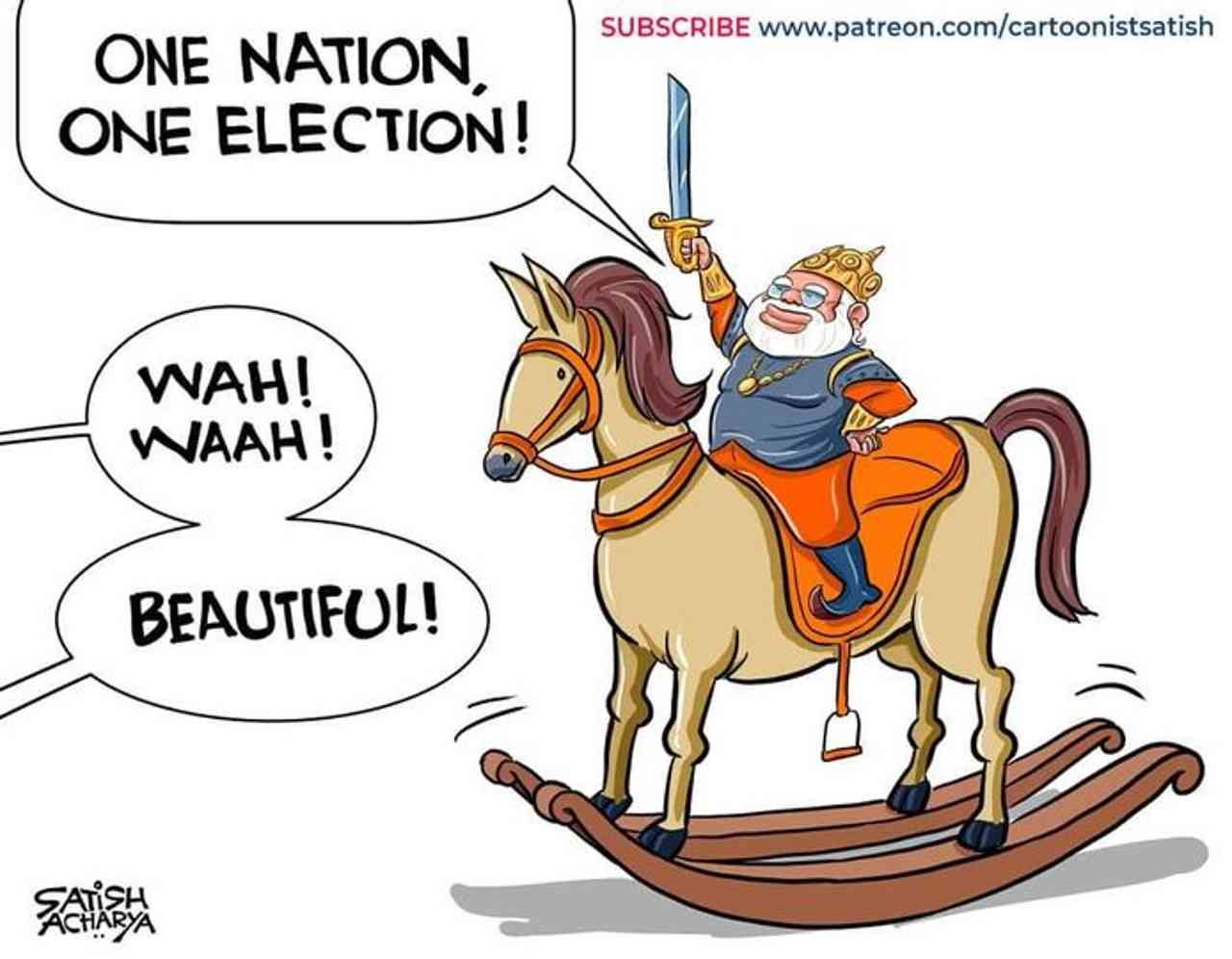"One Nation, One Election" Is a Sinister Design: Reject it Lock, Stock and Barrel

Even as elections to Haryana and Maharashtra, held simultaneously in a single phase on October 21 in 2019, are being held separately with Maharashtra election dates yet to be announced, the Modi cabinet is once again trying to shift the spotlight to its pet 'One Nation, One Election' (ONOE) agenda. The cabinet has accepted the report submitted by the committee chaired by former President Ramnath Kovind regarding the ONOE scheme and announced its resolve to implement it. It is not clear as to how exactly the government proposes to go about this implementation given that it does not have two-thirds majority either in the Lok Sabha or Rajya Sabha without which necessary constitutional amendments for this scheme cannot be passed. But without waiting for the legislature and judiciary to respond to this intended executive fiat, we the people of India must reject this anti-democratic idea with all our might.
The idea has been presented as an urgent electoral reform that would reduce electoral expenditure and promote uninterrupted development by stopping frequent electoral disruptions. The very framing of the issue where elections are presented as a costly disruption of 'development' is inherently anti-democratic. The fact is that the cost incurred by the state is a small fraction of the overall electoral expenditure incurred by major political parties, especially the BJP in the Modi era which has converted elections into an economic extravaganza. If electoral expenditure is really to be reduced, limits must be enforced on the permissible expenditure by political parties where currently there is no limit. Also, the code of conduct that comes into effect for a limited period around every election does not stop 'development', it only stops the concerned government from announcing new schemes or policies.
The logic of cost reduction and uninterrupted development is thus just a bogey. In fact, the Kovind Committee report does not at all ensure simultaneous elections. It talks about holding local body elections within 100 days of the Lok Sabha and Assembly elections which will mean an extended election season for months on end to cover the three tiers of people's representation. If a government loses majority before completion of its term, the mid-term election is proposed to be held for the remainder of the original five-year term and not for a full term of five years. This way we may well end up having more elections with two different values of votes - mid-term elections would have a reduced value while a vote cast in general elections would carry a value of the full five years.
The Constitution had envisioned India as a Union of States, where States would unite in the whole with their due rights. While the term federation or federal is not explicitly used in the Constitution, the framework was clearly federal and certainly not unitary. In opposition to the Constitutional framework of India, the RSS always espoused a unitary India. In an article written after the publication of the Report of the States Reorganisation Committee in 1956, RSS chief Golwalkar had unabashedly advocated the model of a Unitary State "to bury deep for good all talk of a federal structure of our country's Constitution, to sweep away the existence of all 'autonomous' and semi-autonomous 'states' within the one State viz. Bharat and proclaim 'One Country, One State, One Legislature, One Executive' with no trace of fragmentational, regional, sectarian, linguistic or other types of pride being given a scope for playing havoc with our integrated harmony".
When a state like Jammu and Kashmir is stripped of its statehood and bifurcated into two union territories, when instead of being granted statehood Delhi is deprived of its constitutional rights of governance, when the financial rights of states are systematically stolen by the Centre, we can clearly see the attempt to reduce states to glorified municipalities or colonies of an expansionist Centre. One Nation, One Election is now a clear attempt to subordinate state elections to the Lok Sabha elections. The constant chanting of the mantra of 'double engine government' - the theory that development is best guaranteed by having the party in power at the Centre also in power in states - is another admission of this design of centralisation. Undoubtedly this would also transform India's parliamentary democracy increasingly into a presidential system. The Modi cult is now so explicit that in election after election, he asks for votes in his own name. The 'One Nation, One Election' slogan thus becomes complete only when we complete it by adding the silent subtext 'One Party, One Leader'.
For the Modi regime, elections are just a formality to grab power and hold on to it by hook or crook. We have seen the brazen Chandigarh model of fraudulent vote counting, and serial applications of Operation Lotus to break parties and usurp power through the backdoor. The "One Nation, One Election" project is only aimed at institutionalising the trivialisation of elections by limiting the people's right to have their voices heard through the elections. The urgent electoral reforms that are really needed are limits on electoral spending by political parties, amending the law regarding the appointment of election commissioners to ensure the commission's neutrality, making it mandatory for an elected representative to resign before they defect to another party and empowering the electorate by introducing the right to recall. The 'One Nation, One Election' is a terrible anti-democratic idea that only needs to be nipped in the bud.
Charu Bhawan, U-90, Shakarpur, Delhi 110092
Phone: +91-11-42785864 | +91 9717274961 E-mail: info@cpiml.org

